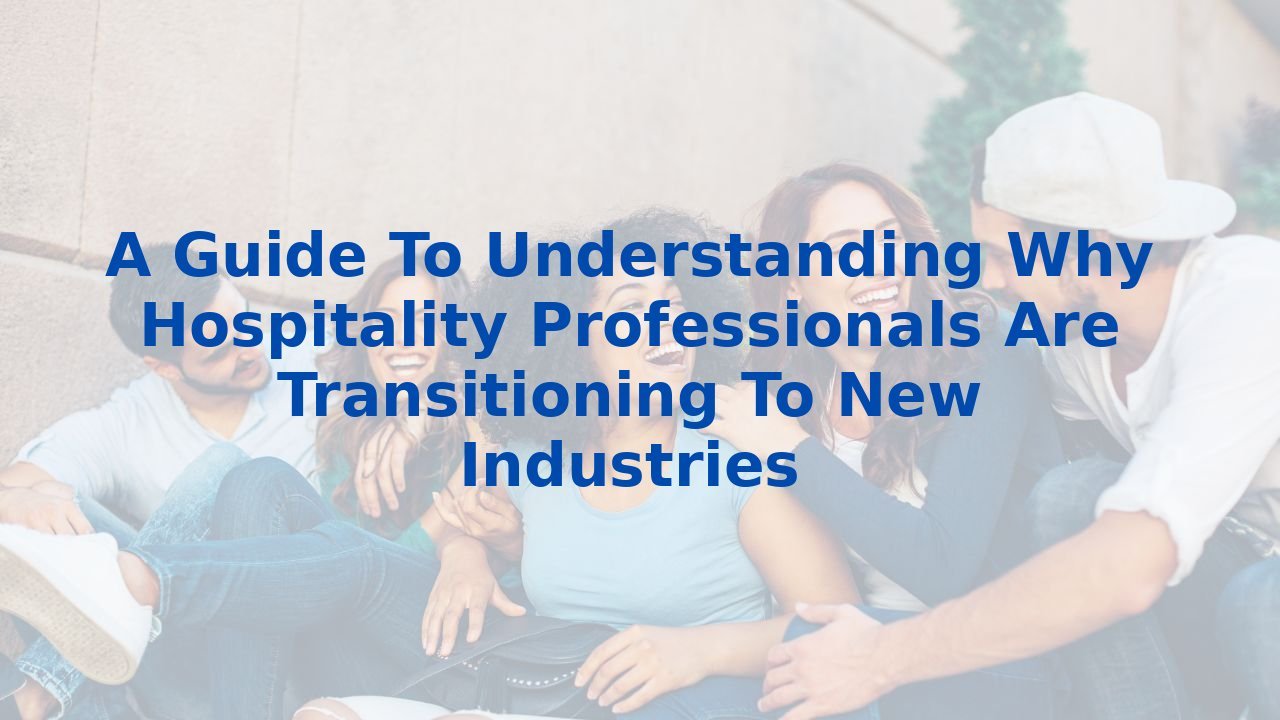A Guide To Understanding Why Hospitality Professionals Are Transitioning To New Industries
A Guide To Understanding Why Hospitality Professionals Are Transitioning To New Industries
Why Are Hospitality Professionals Exploring New Industries?
The hospitality industry has always been a hub of dynamic careers, attracting passionate individuals eager to serve and create memorable experiences. However, a noticeable shift is occurring; many hospitality professionals are transitioning to new fields such as luxury real estate, tech, retail, and aviation. This movement isn't simply a whim; it reflects broader changes in work culture and personal aspirations influenced by recent global events, primarily the COVID-19 pandemic.
Key Reasons Behind the Trend
1. Better Work-Life Balance
Hospitality often demands unpredictable hours and high-pressure situations. Consequently, professionals are gravitating towards industries that promise a more stable work atmosphere—one where personal and professional lives can coexist in harmony.
2. Five-Day Workweeks
The allure of a standard five-day workweek has become particularly appealing. In hospitality, long hours—including weekends and holidays—are the norm. A traditional schedule can seem like a breath of fresh air for those seeking to reclaim their time.
3. Career Growth Opportunities
While hospitality offers fantastic pathways for advancement, some professionals discover that other sectors might provide quicker career progression or greater earning potential. The promise of leadership roles and specialized positions nudges many to explore their options outside the industry.
4. Pandemic Acceleration
The effects of the COVID-19 pandemic have left indelible marks on the hospitality sector. Job losses and a fundamental alteration in consumer behavior prompted a large number of professionals to seek out secure, stable career opportunities elsewhere.
Benefits of Cross-Industry Mobility
1. Transferable Skills
Hospitality professionals possess an impressive array of skills that translate well across various fields. Skills like customer service, communication, problem-solving, and leadership are essential and valued in many sectors.
2. Adaptability
The ever-evolving landscape of the hospitality sector has honed a degree of adaptability in its professionals that is highly desirable. This flexibility is a golden ticket when entering new industries and is often a trait that employers actively seek.
3. Innovation and Technology
Having worked in a technology-forward environment, hospitality professionals can bring valuable insight into integrating innovative practices elsewhere. Their experiences can drive significant advancements, especially in sectors like tech and customer service.
The Role of AI in Enhancing Hospitality Processes
Integrating artificial intelligence (AI) unlocks remarkable advancements in the hospitality business model, enhancing several crucial processes. Consider how:
1. Data-Driven Decision Making
AI facilitates the collection and analysis of immense volumes of data. This data, when leveraged properly, provides insights that can personalize guest experiences while optimizing operational efficiency. Businesses can make informed decisions about inventory management, staffing, and service personalization.
2. Customer Service Enhancement
AI technologies, such as chatbots and virtual assistants, streamline customer interactions, reduce wait times, and elevate service quality. They empower businesses to offer tailored experiences, driving customer satisfaction.
3. Workforce Empowerment
Equipped with AI tools and real-time information, hospitality staff can manage their tasks effectively, deepening their connection to the guest experience. This evolution allows for greater personalization and service orientation.
Benefits of Training Employees for AI
Training employees in AI principles offers critical advantages that can elevate hospitality operations:
1. Improved Efficiency
An informed workforce adept in AI can facilitate rapid adaptation to new technologies, minimizing the learning curve and elevating overall operational efficiency. In an environment where consumer expectations evolve in real-time, agility is non-negotiable.
2. Enhanced Guest Experience
Employees who understand how to capitalize on AI technology can create richer, personalized guest experiences. This heightened attention to detail naturally leads to increased satisfaction and loyalty among guests.
3. Competitive Advantage
In a fierce and ever-evolving industry landscape, having a team trained in AI processes can set a business apart. It enables organizations to remain at the forefront of technological advancements and service excellence.
Conclusion
The hospitality sector is undergoing a transformative shift. Talented professionals are increasingly drawn to explore new career paths that promise better work-life integration, predictable schedules, and growth opportunities. As these individuals branch out, they carry with them a treasure trove of skills and experiences that can benefit countless industries. Furthermore, the incorporation of AI in enhancing processes within hospitality provides a solid foundation for attracting these professionals to new fields, especially as organizations increasingly recognize the need for skilled employee training in AI technologies. Ultimately, embracing change, training, and innovation presents an opportunity not just for individual growth, but for collective advancement across various sectors.



